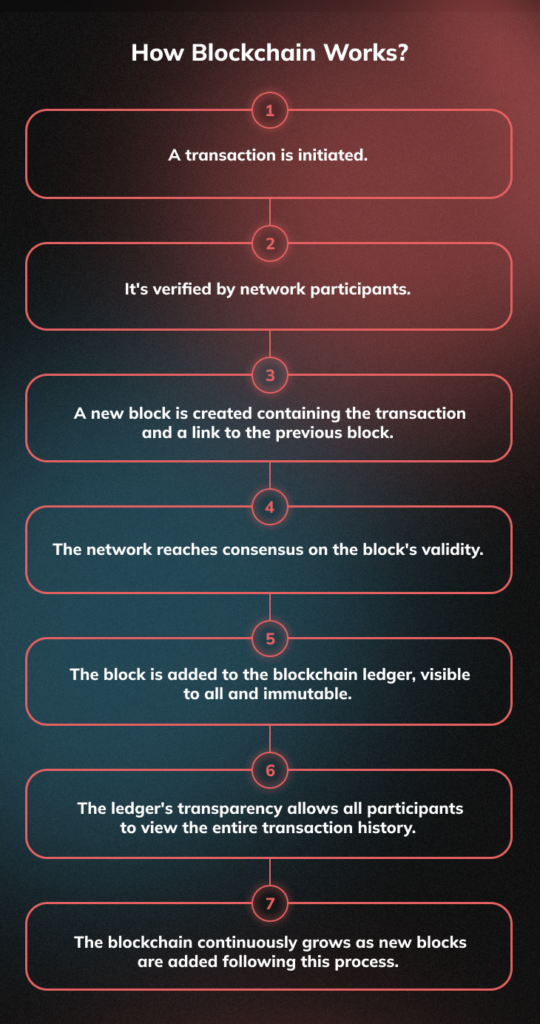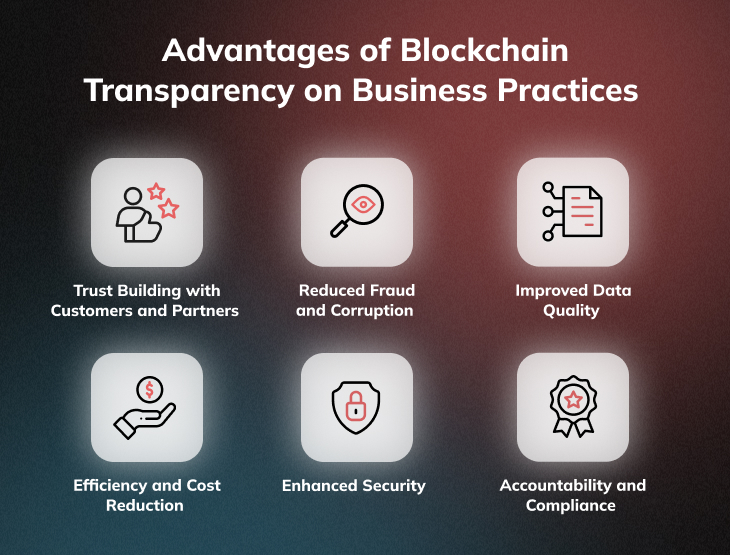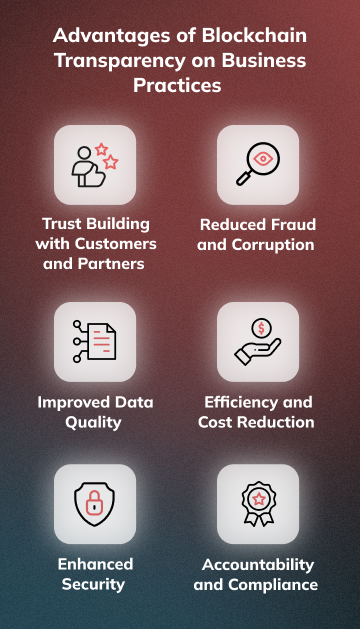


21 MIN. READ
Blockchain technology is heralding a new era in business operations, fundamentally changing how companies maintain transparency and integrity. At its core, blockchain provides a decentralized and immutable ledger, enabling secure, transparent record-keeping that is resistant to tampering and fraud. This transformative technology ensures that every transaction, once recorded, becomes a permanent part of the historical record, providing unparalleled blockchain transparency.
As a result, businesses can foster greater trust among stakeholders, from investors to customers, by demonstrating their commitment to ethical practices and accountability. Embracing blockchain’s potential, companies across various sectors are redefining transparency, making it an integral part of their operational ethos.
Unveiling blockchain technology reveals a innovative shift in the digital world, particularly in its role as the driving force behind cryptocurrencies. Originating as the underlying framework for Bitcoin, blockchain has emerged as a groundbreaking innovation, characterized by its decentralized, unchangeable, and clear nature. Unlike traditional centralized systems, blockchain operates on a network of computers, making it highly resistant to fraud and cyber-attacks. Each ‘block’ in the chain contains a number of transactions, once a block is completed, it is set in stone and becomes a part of this unchangeable ledger.
What sets blockchain apart is its ability to facilitate transactions without the need for intermediaries. This not only enhances security but also reduces transaction times and costs, revolutionizing financial transactions. The impact of blockchain extends far beyond cryptocurrencies like Bitcoin and Ethereum. Its potential applications are vast, ranging from improving supply chain management to ensuring integrity in voting systems, underpinned by transparency in blockchain.
Blockchain technology is instrumental in the creation of smart contracts – self-executing contracts with the terms directly written into code. This feature opens new horizons for automating and streamlining complex business processes. The transparency aspect of blockchain, where all transactions are publicly verifiable, instills a greater level of trust and accountability in digital interactions.
In essence, blockchain technology is not just the backbone of cryptocurrencies, it’s a catalyst for innovation across various sectors. Its ability to provide secure, fast, and transparent transactions is setting the stage for a more interconnected and efficient digital future. As we continue to explore its capabilities, blockchain stands as a testament to the transformative power of digital technology.
Through its ingenious mechanics, blockchain technology embodies the essence of transparency. Central to its design is a decentralized ledger system, where transaction records are distributed across numerous nodes, reducing central control and enhancing security. This setup ensures no single entity can manipulate the data, fostering trust and openness.


Furthermore, blockchain’s defining feature is its unchangeable transaction records. Each transaction, once recorded and encrypted, is irreversibly linked to the previous one, creating a tamper-resistant chain. This immutability guarantees that every transaction is permanently recorded, providing a transparent, verifiable history. Together, these mechanics form the backbone of blockchain’s clear, secure, and reliable framework.
Blockchain ensures transparency through its decentralized structure and immutable encrypted records. By distributing data across a network of nodes, it eliminates centralized control, reducing risks of manipulation. Each transaction is securely recorded and linked to the preceding one, creating a chain. This chain cannot be altered retrospectively, making every transaction traceable and clear. Such a structure not only enhances security but also fosters trust, as stakeholders can verify transactions independently, ensuring transparency in every interaction within the blockchain network.
A decentralized ledger system is a foundational aspect of blockchain technology, fundamentally changing how data is stored and accessed. Instead of relying on a central authority, it distributes the data across a vast network of computers. Each node in the network holds a copy of the ledger, ensuring data integrity and reducing the risk of tampering or control by a single entity. This system enhances security, promotes transparency, and facilitates peer-to-peer transactions, transforming traditional data management and transaction methodologies.
Immutable transaction records are a cornerstone of blockchain technology, ensuring the integrity and trustworthiness of digital transactions. Once a transaction is recorded on a blockchain, it becomes permanently etched into the ledger, immune to alteration or deletion. This immutability is achieved through cryptographic hashing and the consensus of network participants, making it virtually impossible to alter past records without detection. This feature not only secures data against deception and manipulation but also establishes a transparent and reliable historical record for all network participants.
The advantages of blockchain transparency over traditional databases are numerous and significant, offering a innovative approach to data management. One of the most prominent features of blockchain is its data integrity where the unchangeable nature of blockchain ensures that once a record is made, it cannot be altered, which greatly enhances the trustworthiness of the data.
| Feature | Blockchain Transparency | Traditional Database |
|---|---|---|
| Data Integrity | Immutable records ensure data cannot be altered post-transaction. | Data can be modified, leading to potential integrity issues. |
| Decentralization | Distributed ledger reduces risks of centralized control and single points of failure. | Centralized data storage, vulnerable to system failures or attacks. |
| Auditability | Every transaction is traceable and auditable, fostering accountability. | Auditing can be complex and less transparent. |
| Access Control | Enhanced by cryptographic techniques, ensuring only authorized access. | Relies on traditional security measures, which can be vulnerable. |
| Real-time Updates | Transactions are updated in real-time across the network. | Updates may require time, leading to data latency. |
| Trust and Security | Built-in trust mechanism due to transparent and immutable nature. | Trust depends on the database’s security measures and administration. |
| Reduction in Fraud | Tamper-evident design significantly reduces the risk of fraud. | More susceptible to fraud and data manipulation. |
| Cost Efficiency | Lower operational costs due to elimination of intermediaries and reduced need for oversight. | Higher costs for maintenance, security, and administration. |
Blockchain’s decentralized ledger mitigates risks associated with centralized control, reducing vulnerabilities to system failures or attacks. This is in stark contrast to traditional databases that often rely on centralized data storage. Additionally, blockchain’s real-time updates and distributed ledger provide immediate transparency across the network, a feature not always present in traditional databases.
The use of blockchain technology significantly boosts security and trust across various industries. Its unchangeable ledger ensures that once data is entered, altering it without detection becomes nearly impossible, providing a highly secure environment for conducting transactions. This level of transparency builds trust among all stakeholders, as each transaction is open to scrutiny and verification.
In sectors like finance and supply chain management, this leads to enhanced confidence and a reduced risk of deception. The ability of blockchain to offer a tamper-proof and clear record- maintenance system is key in creating a more secure and trustworthy digital landscape, resulting in more reliable and ethical business operations.
The implementation of blockchain significantly reduces fraud and errors. Its clear and immutable nature means that once transactions are recorded, they cannot be altered or tampered with, providing a clear audit trail. This level of oversight minimizes the risk of fraudulent activities and human errors. In sectors like finance, supply chain, and legal documentation, the reduction in deception and errors is particularly impactful, enhancing operational integrity and trust. Blockchain’s clear record-keeping not only improves accuracy but also instills a higher level of confidence in business transactions and processes.
The transparent nature of blockchain enhances accountability by offering a clear, unchangeable record of all transactions. Each action on a blockchain is permanently recorded and publicly accessible, ensuring that entities cannot deny their involvement in transactions. This level of visibility holds all parties accountable for their actions, fostering a culture of responsibility and integrity.
Blockchain’s clear visibility offers manifold benefits for businesses, significantly enhancing their operations. Trust building with customers and partners is a key element, as blockchain’s inherently visible nature fosters a higher level of confidence in business dealings. This technology drastically reduces deception and corruption by providing an immutable record of transactions, making any tampering evident. Improved data quality is ensured, as blockchain provides accurate, tamper-proof records.


Businesses experience efficiency and cost reduction due to streamlined processes and reduced need for intermediaries. Enhanced security is another crucial benefit, with blockchain’s decentralized nature providing robust protection against cyber threats. Lastly, blockchain aids in accountability and compliance, ensuring businesses adhere to regulatory standards, further building trust with customers and partners.
Transparency in blockchain plays a pivotal role in building trust with customers and partners. By providing a transparent and unchangeable record of transactions, it assures all parties of the integrity and authenticity of their interactions. This transparency fosters a sense of security and reliability, crucial for establishing and maintaining trust. In industries where transparency is key, such as finance and supply chain, blockchain’s ability to provide clear, tamper-proof records helps build stronger, more trusting relationships with customers and business partners.
The open ledger system of blockchain serves as a powerful tool in combating fraud and corruption. Its decentralized structure and immutable record-keeping greatly obstruct unauthorized changes and deceptive practices. Each transaction on a blockchain is evident, traceable, and permanently logged, making it extremely difficult to alter data undetected. This degree of openness and accountability is key in diminishing fraudulent activities and corruption, particularly in industries vulnerable to these problems, fostering a more ethical and clearer operational environment.
Visible documentation through blockchain technology significantly enhances data quality by ensuring accuracy and reliability. In a blockchain network, data undergoes validation and consensus agreement before its permanent recording, mitigating risks of errors and discrepancies. This unchangeable and observable nature of blockchain assures that once data is input, it remains unaltered, preserving its integrity over time. Such enhancement in data quality is crucial for informed decision-making and sustaining trust in systems that depend on precise and current information.
The use of blockchain technology provides notable benefits in terms of efficiency and cost reduction. By streamlining record-keeping with an unchangeable, transparent ledger, it eliminates the need for intermediaries, reducing administrative overheads and associated costs. This efficiency is further enhanced by the trust and reliability inherent in blockchain transactions, which reduces the time and resources spent on audits and compliance checks. Overall, the adoption of blockchain technology can lead to more efficient operational processes, resulting in substantial cost savings for businesses and organizations.
The inherent openness of blockchain technology significantly boosts security in data management and transactions. Its decentralized nature means that data is not stored in a single location, greatly reducing the risk of centralized data breaches. Furthermore, the cryptographic protection of each transaction within the blockchain ensures that data is secure and tamper-proof. This high level of security is crucial for sensitive information and financial transactions, providing users with confidence in the integrity and safety of their data within the blockchain network.
A clear audit trail provided by blockchain technology reinforces accountability and compliance, delivering an unalterable, clear record of transactions. Every activity on the blockchain is openly recorded and permanently stored, facilitating straightforward audits and ensuring adherence to regulations and internal policies. This aspect is especially advantageous in sectors with strict regulatory demands, as it guarantees that every action is trackable and responsible. Enhanced observability and traceability through blockchain technology not only uphold regulatory compliance but also bolster ethical business conduct.
Blockchain transparency is transforming various industries by enhancing the integrity and trustworthiness of operations. Its primary application lies in creating an unalterable and clear record of transactions, which significantly reduces deception and errors, streamlines processes, and boosts efficiency. The benefits of blockchain transparency are pivotal in different sectors where data authenticity and traceability are crucial. It enables stakeholders to verify the accuracy of information in real-time, fostering a new level of accountability and trust. The broad applicability of blockchain transparency, from enhancing operational efficiency to ensuring data integrity, signifies a major shift towards more secure, transparent, and reliable business practices in the digital age.
A transparent audit trail provided by blockchain revolutionizes supply chain management with an unchangeable, visible record from origin to delivery. This clear visibility ensures product authenticity, tracks the production process, and monitors goods movement, significantly reducing the risk of counterfeits and fraud. It enables stakeholders to verify the origin and journey of products, fostering trust and efficiency. Such clarity in supply chains not only enhances accountability but also optimizes operations, leading to more sustainable and consumer-trusted business practices.
The clear tracking in commercial campaigns facilitated by blockchain introduces a new level of integrity and efficiency. By recording marketing activities on the blockchain, businesses can provide indisputable evidence of their advertising claims and expenditures. This open visibility fosters consumer trust and credibility, enabling customers to authenticate the veracity of campaigns. Additionally, it streamlines partnerships, ensuring clarity in campaign results and financials, which leads to more effective, accountable, and trust-generating marketing strategies within the commercial industry.
The management of royalties and intellectual property is being revolutionized by the clear tracking capabilities of blockchain technology. By recording IP rights and royalty transactions on a blockchain, creators and owners receive clear, tamper-proof records of ownership and usage. This ensures fair distribution and tracking of royalties, resolving disputes over intellectual property rights more efficiently. For artists, authors, and inventors, this means greater control and transparency over their creations, fostering a fairer and more equitable environment for the monetization and protection of their work.
The clear tracking provided by blockchain technology significantly improves rewards and loyalty programs by ensuring equitable and transparent monitoring of customer rewards. Utilizing blockchain, businesses can create tamper-proof records of points earned and redeemed, fostering trust among participants. This transparency not only reduces discrepancies and deception but also streamlines program management. Customers benefit from a clear, reliable view of their rewards, enhancing their engagement and loyalty. This approach leads to more effective, trustworthy loyalty programs, boosting customer satisfaction and long-term business relationships.
Through clear and honest interactions, blockchain technology fosters positive politics in partnerships. In collaborative ventures, blockchain creates a trustworthy platform where all transactions and agreements are transparent and immutable. This transparency reduces misunderstandings and conflicts, fostering a positive political atmosphere. Partners can confidently engage, knowing that their contributions and rights are securely recorded and respected. Such an environment encourages ethical practices, mutual respect, and equitable dealings, leading to more productive and harmonious business partnerships.
The application of blockchain technology offers a novel solution for managing legal issues and copyright management. By providing an unchangeable ledger for recording copyrights and legal agreements, it ensures a clear, tamper-proof record of ownership and usage rights. This transparency is invaluable in resolving disputes, proving ownership, and managing permissions, significantly reducing the risk of infringement and unauthorized use. For creators and legal professionals, blockchain’s clear record-maintenance streamlines copyright management, enhances legal compliance, and protects intellectual property more effectively and efficiently.
By using blockchain to demonstrate transparency, many companies can attract larger audiences and benefit from future partnerships with other companies that share the same values. Companies across various sectors are already leveraging the capabilities of blockchain technology to transform their business operations. Businesses are utilizing blockchain’s ability to provide immutable and transparent record-keeping, enhancing the trust and integrity of their transactions.
This technology has proven particularly beneficial in areas requiring stringent tracking and verification processes, leading to improved efficiency, reduced deception, and enhanced customer satisfaction. By adopting blockchain transparency, companies are not only streamlining their internal processes but also setting new standards in their respective industries for openness and accountability, demonstrating the transformative potential of this technology in the business world.
FedEx is at the forefront of implementing blockchain technology in the logistics and shipping industry. By integrating blockchain technology, they are transforming their supply chain operations, ensuring greater transparency and accuracy in tracking shipments. This advancement allows for real-time updates and unchangeable records of deliveries, enhancing the security and efficiency of their global shipping network. The implementation of blockchain by FedEx sets a benchmark in the industry, showcasing how technology can significantly improve reliability and customer trust in logistics.
Nike is adopting blockchain technology to transform its brand and enhance the customer experience. By integrating blockchain technology, Nike is tackling counterfeiting and ensuring the authenticity of its products. This approach enables customers to verify the origin and authenticity of their purchases, enhancing trust in the brand. Additionally, Nike is exploring blockchain for innovative customer engagement strategies, like securing digital rights for unique designs. This adoption of blockchain demonstrates Nike’s commitment to innovation, authenticity, and customer satisfaction in the competitive sports apparel market.
NBA Top Shot is utilizing blockchain technology to revolutionize the sports collectibles industry. Utilizing blockchain, it creates digital collectibles – unique, secure, and traceable virtual cards featuring NBA highlights and player moments. This approach guarantees the authenticity and ownership of each collectible, creating a trustworthy digital marketplace for fans. NBA Top Shot’s use of blockchain not only offers fans a novel way to connect with the sport but also sets a new standard in the digital memorabilia space.
Maersk, a leading company in container logistics, is utilizing blockchain technology to bring transformative changes to the shipping industry. Through their collaboration with IBM on the TradeLens platform, they utilize blockchain to enhance the efficiency and transparency of global trade. This technology provides immutable, real-time tracking of cargo, reducing paperwork and simplifying the complex supply chain process. Maersk’s adoption of blockchain significantly improves reliability, security, and trust in international shipping, setting a new industry standard for operational excellence.
Walmart is leading the way in adopting blockchain technology to improve food safety and increase efficiency in its supply chain. By implementing blockchain technology, Walmart can track the journey of food products from farm to store shelves in real-time. This system ensures quick response to food safety issues, enhances traceability, and builds consumer trust. Walmart’s use of blockchain in its supply chain represents a significant step in ensuring product authenticity and promoting responsible sourcing practices in the retail industry.
Ubisoft, a prominent video game developer, is incorporating blockchain technology to drive innovation within the gaming industry. By incorporating blockchain, they’re exploring new ways to manage digital rights and create unique, player-owned assets. This technology enables verifiable ownership of in-game items and ensures secure transactions within the gaming community. Ubisoft’s foray into blockchain reflects its commitment to enhancing player experience and trust, pioneering new frontiers in how games are played, owned, and experienced in the digital age.
Though transformative, blockchain technology encounters various challenges and considerations. Scalability is a major issue, as increasing transaction volumes can slow down the system, raising questions about its efficiency on a larger scale. Privacy concerns also arise, given the clear nature of blockchain, necessitating a balance between openness and data protection.
Integrating blockchain with existing legacy systems poses technical and financial challenges, often requiring substantial investment. Regulatory uncertainty is another significant hurdle, as the decentralized nature of blockchain can conflict with established legal frameworks. Lastly, public understanding and acceptance of this complex technology remain crucial for its widespread adoption and success. Addressing these challenges is essential for harnessing the full potential of blockchain transparency.
Scalability issues present a significant challenge in the application of blockchain technology. As blockchain networks grow in usage, the volume of data increases, potentially slowing down transaction processing times and increasing costs. This is particularly problematic for large-scale applications that require fast, efficient transaction handling. Addressing scalability is crucial for blockchain’s wider adoption, necessitating innovative solutions like network optimization, off-chain transactions, and advanced consensus mechanisms to maintain performance and efficiency without compromising the security and transparency that blockchain offers.
Privacy issues pose a significant challenge in the realm of blockchain technology. While the technology offers an open ledger system, this transparency can clash with the need to protect sensitive data. Balancing accountability with confidentiality is complex, as every transaction is publicly recorded and traceable. Addressing these privacy issues requires sophisticated solutions, such as encryption, permissioned blockchains, or selective transparency, ensuring data security and privacy while maintaining the integrity and benefits of a transparent blockchain system.
Navigating the regulatory landscape for blockchain technology is complex and continually evolving. As a relatively new technology, blockchain faces a landscape of uncertain and varied regulations across different jurisdictions. This lack of standardized legal frameworks can create challenges in compliance, especially for businesses operating internationally. Navigating this environment requires a keen understanding of regional laws and ongoing developments. Ensuring blockchain implementations comply with existing regulations while advocating for clear, supportive legal structures is essential for its sustainable growth and acceptance.
The future of blockchain transparency holds immense potential across various sectors. It’s poised to revolutionize data integrity, bringing a new level of trust and efficiency to transactions. In finance, we’ll likely see clearer and secure transactions, while in supply chain management, the technology could enable unprecedented product traceability. The healthcare sector could benefit from secure, transparent patient records, enhancing data sharing and privacy.
Furthermore, blockchain could play a significant role in governance, ensuring clear and fair electoral processes. As the technology matures, we can expect innovative applications, improved scalability, and enhanced privacy solutions, making blockchain an integral part of the digital infrastructure in numerous industries.
Emerging trends in blockchain technology are shaping its future applications and potential. Decentralized finance (DeFi) is gaining momentum, offering more open and transparent financial systems. Supply chains are increasingly adopting blockchain for traceable, tamper-proof records, enhancing product authenticity. In governance, blockchain is being explored for clear voting systems.
Moreover, Non-Fungible Tokens are transforming digital ownership and rights management. These trends highlight blockchain’s growing role in creating transparent, secure, and efficient systems across various industries, signaling its expanding influence.
Blockchain technology’s potential future applications span diverse sectors, promising transformative impacts. In healthcare, blockchain could ensure secure, transparent patient data management. The education sector might see secure record-keeping of credentials, enhancing verification processes. Real estate could benefit from streamlined property transactions and clear documentation
Additionally, blockchain could revolutionize voting systems in governance, ensuring fair and clear elections. These diverse applications highlight blockchain’s versatility and its potential to bring transparency, security, and efficiency to numerous industries in the future.
The road ahead for blockchain technology, focusing on transparency, is marked by significant advancements and broader adoption. We can anticipate enhanced scalability solutions to accommodate growing demands, making blockchain more efficient and accessible. Privacy-preserving techniques will likely evolve, balancing transparency with data protection. Integration with emerging technologies like AI and IoT will open new avenues for innovation. Moreover, clearer regulatory frameworks are expected to emerge, providing a stable foundation for further development and application in various industries.
Blockchain’s role in enhancing transparency marks a pivotal shift in business operations. Its ability to provide unchangeable, transparent records has transformed how transactions and data are managed, fostering trust and integrity across sectors. This transparency is not just a technological feature but a foundational change in ensuring accountability, reducing deception, and promoting ethical practices. As businesses continue to evolve, the importance of transparency, underpinned by blockchain technology, becomes increasingly vital, setting the standard for future operations and stakeholder trust.
In this Frequently Asked Questions section, we’ll answer the most common queries about Blockchain Transparency. Discover how this innovative technology enhances data integrity and trust in business, and explore its key features and applications in answering your pressing questions.
In the context of blockchain, business transparency means providing an open, verifiable record of transactions and operations. Blockchain technology ensures that data is immutable and accessible to stakeholders, enhancing trust and accountability. It offers a clear view of business activities, fostering integrity and informed decision-making.
Blockchain allows transparency by providing a decentralized ledger where all transactions are recorded permanently and publicly. Each transaction is verifiable and unchangeable, making any alteration evident. This system ensures that stakeholders can trust the data’s integrity, fostering transparency and accountability in various applications.
Blockchain transparency revolutionizes supply chain management by enabling real-time, immutable tracking of products from their origin to final delivery. This ensures product authenticity, significantly reduces the chances of deception, and streamlines efficiency across the supply chain. By providing stakeholders with the ability to verify each step, blockchain fosters enhanced trust and collaboration, leading to more efficient, reliable, and transparent supply chain operations.